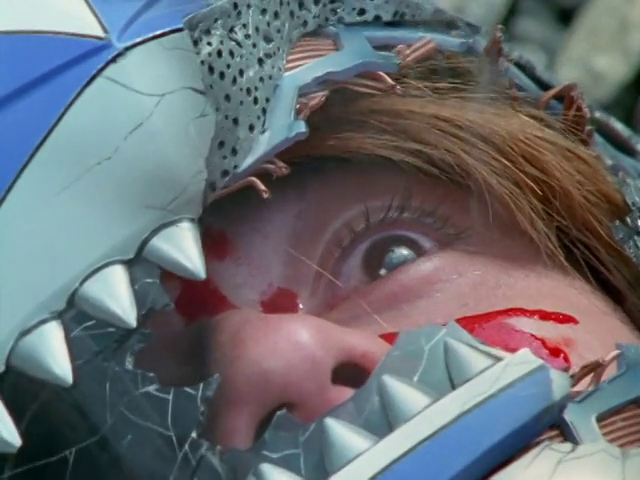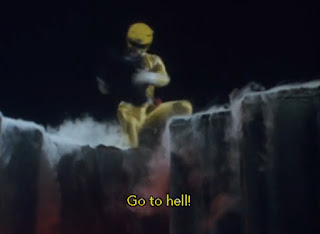Japan has much less censorship rules than America does, to the point where some people thing that Super Sentai is targeted towards an older audience than Power Rangers is. Nope, they are both kids shows. However, with a little more freedom, Super Sentai gets away with things that would never appear on an American kids show. So, just for fun, allow me to countdown what I consider the Top 5 things Super Sentai can do that Power Rangers cannot. (Opinion based.)
5. Bullets
Something strangely common among censorship is changing bullets into lasers. I have no idea why lasers are considered less violent, probably because they are less realistic. Super Sentai has had Rangers that fire lasers, but from time to time they actually fire real bullets. This is too violent for American censors, so they are either changed into lasers or removed. I mentioned this in my
General Differences countdown, but it is worth a re-mention.
4. Blood & Violence
Even Super Sentai would not show gore, but the characters are allowed to bleed. Even when there isn't blood, there is stabbing, beatings, and characters besides the villains are allowed to die. I know Power Rangers has killed off a few good guys in history, but it is always downplayed and most of the time they magically come back to life. Power Rangers never even says words like "die", "kill", or "dead", it is always "destroyed". A couple scenes that come to mind in Sentai is when a ranger in Zyuranger stops a spear with his bare hands and bleeds all over it, and in Gokaiger when a ranger steps on an enemies foot and stabs a sword through them both in order to keep the enemy still for an attack. Whether or not blood is necessary for a good action scene is debatable, but it is kind of shocking to see if you are used to Power Rangers.
3. Strong Language
Okay, this is debatable because Japanese doesn't really have "curse words" in the same scenes that English does and their social taboo words are most sexual that aren't used. However, while the words themselves are not a "cuss", the context behind what the characters say has the same meaning. Granted, Super Sentai does not use a whole lot of profanity, just things that would translate to something in the range of "damn you" or "go to hell". Which is not much, but a lot more than Power Rangers could ever say. I think the worst thing I have ever heard someone get called on Power Rangers is a "dweeb".
2. "Fanservice"
This is one of those things I do not understand. Do little boys in Japan really "mature" that fast? Or, are these instances meant to be funny? Female rangers always have to show a lot of leg, there is the occasional instant of skirt flipping, and in Dekarangers the Pink Ranger is obsessed with bubble baths. I honestly do not know if this is meant to be candy for the kids parents who are watching with them or what. Do not tell me this is just a cultural thing, the exact same "sex sells" mindset that American producers have is still very clearly in place.
It is a fact that American television absolutely hates references to God or the Devil in children's shows are are not specifically labeled as religious content. Super Sentai has had seasons with deities numerous times, sometimes even just straight up God or Satan. Power Rangers would change the names and and remove all crosses or other symbolism. Satan has been various enemies and Kami-sama has appeared as both a male and female. You can decide for yourself if these refences are "offensive", "prideful", or "satire", I just see it as part of the alternative universes.
This are some things that Power Rangers chose not to adapt from Super Sentai most likely in fear of backlash. It it also a fair example of Japan's more lenient policies when it comes to what kids are allowed to see. I am honestly not sure which way is better, but this is an issue where it may be best to agree to disagree.







No comments:
Post a Comment